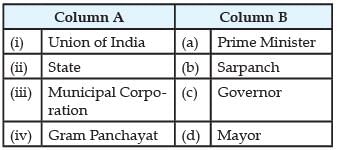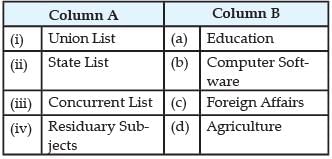Assertion & Reason Test: Federalism - Class 10 MCQ
18 Questions MCQ Test - Assertion & Reason Test: Federalism
Match the following items given in Column A with those column B:


Analyse the information given below, considering one of the following correct options:
It includes subjects of national importance such as defence of the country, foreign affairs, banking, communications and currency. They are included in this list because we need a uniform policy on these matters throughout the country.
Assertion and Reason Type Questions:
In the questions given below, there are two statements marked as Assertion (A) and Reason (R). Read the statements and choose the correct option:
Assertion (A) : Federalism is a system of government in which the power is divided between a central authority and various constituent units of the country.
Reason (R) : Usually, a federation has one level of government.
Match the following items given in Column A with those column B:

Find the incorrect option:
Major steps towards decentralisation taken in 1992 were :
Analyse the information given below, considering one of the following correct options:
It includes subjects of common interest to both the Union Government as well as the State Governments, such as education, forest, trade unions, marriage, adoption and succession. Both the Union as well as the State Governments can make laws on the subjects mentioned in this list.
Assertion and Reason Type Questions:
In the questions given below, there are two statements marked as Assertion (A) and Reason (R). Read the statements and choose the correct option :
Assertion (A) : When power is taken away from Central and State governments and given to local government, it is called decentralization.
Reason (R) : The basic idea behind decentralization is that there are a large number of problems and issues which are best settled at the local level.
Find the incorrect option:
Which of the following pair is incorrect?
DIRECTION: Mark the option which is most suitable:
Assertion : India has a federal system.
Reason : Under a unitary system, either there is only one level of government or the sub-units are subordinate to central government.
DIRECTION: Mark the option which is most suitable:
Assertion : The subjects which are not included in Union List, State List and Concurrent List are considered as residuary subjects.
Reason : The subjects included that came after constitution was made and thus could not be classified.
DIRECTION: Mark the option which is most suitable:
Assertion : Zilla Parishad Chairperson is the political head of the zilla parishad.
Reason : Mayor is the head of municipal corporation.
DIRECTION: Mark the option which is most suitable:
Assertion : Belgium and Spain has ‘holding together’ federation.
Reason : A big country divides power between constituent states and national government.
DIRECTION: Mark the option which is most suitable:
Assertion : Third-tier of government is local government.
Reason : It made democracy weak.
DIRECTION: Mark the option which is most suitable:
Assertion : Hindi is identified as the only official language of India.
Reason : It helped in creating supremacy of Hindi speaking people over others.
DIRECTION: Mark the option which is most suitable:
Assertion : A major step towards decentralization was taken in 1992 by amending the constitution.
Reason : Constitution was amended to make the third tier of democracy more powerful and effective.
DIRECTION: Mark the option which is most suitable:
Assertion : Coalition government is formed during dearth of coal in the country.
Reason : It helps in overcoming coal crisis.
A system of government in which power is divided between a central authority and various constituent unit of the country is called
DIRECTION: Mark the option which is most suitable:
Assertion : It is very simple to make the changes in the basic structure of the constitution.
Reason : Both the houses have power to amend the constitution independently.



















